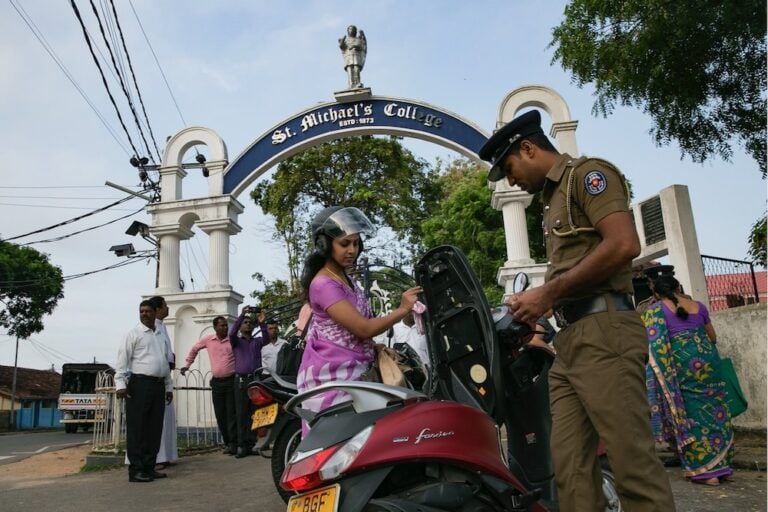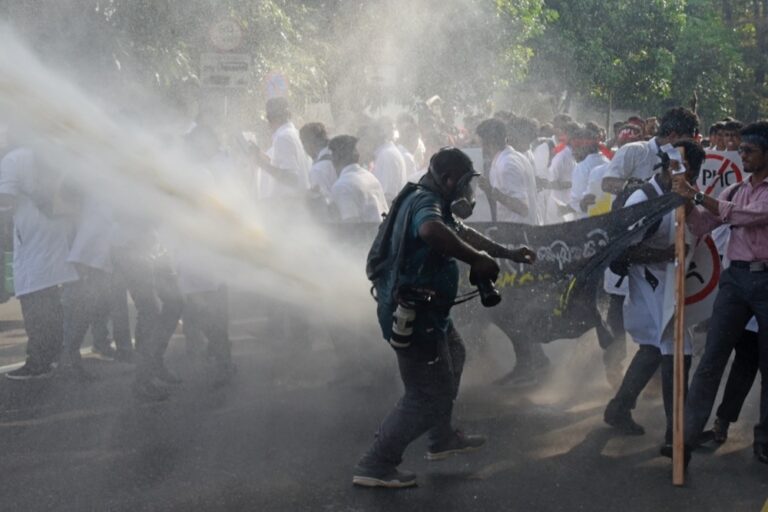(IFJ/IPI/RSF/IFEX) – The following is a joint action by the International Federation of Journalists (IFJ), International Press Institute (IPI), Reporters sans frontières (RSF) and two other organisations: International Press Freedom Mission Global Media Rights Groups Condemn “Culture of Impunity and Indifference” in Sri Lanka The International Press Freedom Mission today condemned a “culture of impunity […]
(IFJ/IPI/RSF/IFEX) – The following is a joint action by the International Federation of Journalists (IFJ), International Press Institute (IPI), Reporters sans frontières (RSF) and two other organisations:
International Press Freedom Mission
Global Media Rights Groups Condemn “Culture of Impunity and Indifference” in Sri Lanka
The International Press Freedom Mission today condemned a “culture of impunity and indifference” over killings and attacks on journalists in Sri Lanka. Since the beginning of the New Year, both the killing of a senior editor and the attack on the facilities of a popular independent TV channel have led to a total paralysis of the media community.
Launching a new report, “Media under Fire: Press Freedom Lockdown in Sri Lanka”, the International Mission criticised the government over its inaction and failure to take the attacks, murder and assassination of reporters seriously. This has in turn led to an almost total blackout of independent and objective reporting from the North and East of Sri Lanka, which have seen the worst of the country’s long-running civil war.
“In all the cases of attacks against media and assassinations of reporters there are few serious investigations by the authorities and none of the killers are ever brought to trial,” said the International Mission. “A hostile environment of intolerance propelled forward by the top political leadership has created a culture of impunity and indifference making every day hunting season for attacks on media staff.”
Based on its visit to Sri Lanka in October 2008, the International Mission noted three trends relating to the coverage of the conflict: lack of press access and independent information flow in the conflict zones; a wave of assaults and intimidation of journalists covering the conflict; and self-censorship by the media on the realities of the war.
Since the International Mission took place, the situation for media has continued to deteriorate in Sri Lanka. On 6 January this year the studio of the Maharaja Television/Broadcasting Network (MTV/MBC) was attacked by armed gunmen. On 8 January, Lasantha Wickrematunga, editor of the Sunday Leader, was shot dead by two men on a motorcycle as he drove to work in Colombo. On 15 January, police began a widespread search for MTV Channel 1 Chief Chevaan Daniel after accusations of him being behind the attack on his station.
According to the findings of the International Mission, reporters and editors conveying messages that are critical of the government’s war against the LTTE are labelled as “traitors” and “terrorists” where they work in an increasingly hostile environment of censorship and fear.
The International Mission is shocked at the repeated instances of elected representatives and Government Ministers using violent and inflammatory language against media workers and institutions. Not surprisingly this has led to widespread self-censorship among journalists in order to protect their lives.
“The killing of Lasantha and the deaths of at least 8 other journalists along with 2 disappeared since 2007 illustrates in painful detail just how journalists and media staff continue to suffer for their profession,” said the International Mission. “Without a proper investigation into Lasantha’s assassination and the attack on MTV, there will be no chance at all for the government to claim that it assumes responsibility to guarantee the basic safety and independence of media,” said the International Mission.
We urge the government to accept the creation of an international and independent commission to investigate the two recent attacks in line with requests by Sri Lankan journalists and media institutions. As a group, the International Mission will offer its assistance to form this commission and to participate in the investigation.
Since 2006, the International Press Freedom Mission to Sri Lanka has conducted three missions to Sri Lanka. The most recent mission in October 2008 had representatives from the following international media organisations:
International Federation of Journalists (IFJ)
International Media Support (IMS)
International Press Institute (IPI)
International News Safety Institute (INSI)
Reporters Without Borders (RSF)
For further information on the Wickrematunga case, see: http://ifex.org/en/content/view/full/99736


